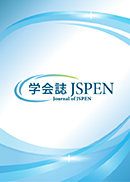Volume 3, Issue 5
Displaying 1-9 of 9 articles from this issue
- |<
- <
- 1
- >
- >|
-
2021Volume 3Issue 5 Pages 271
Published: 2021
Released on J-STAGE: May 26, 2022
Download PDF (970K)
-
2021Volume 3Issue 5 Pages 272-280
Published: 2021
Released on J-STAGE: May 26, 2022
Download PDF (923K) Full view HTML -
2021Volume 3Issue 5 Pages 281-290
Published: 2021
Released on J-STAGE: May 26, 2022
Download PDF (1096K) Full view HTML
-
2021Volume 3Issue 5 Pages 291-296
Published: 2021
Released on J-STAGE: May 26, 2022
Download PDF (932K) Full view HTML -
2021Volume 3Issue 5 Pages 297-301
Published: 2021
Released on J-STAGE: May 26, 2022
Download PDF (853K) Full view HTML
-
2021Volume 3Issue 5 Pages 302-307
Published: 2021
Released on J-STAGE: May 26, 2022
Download PDF (1943K) Full view HTML -
2021Volume 3Issue 5 Pages 308-312
Published: 2021
Released on J-STAGE: May 26, 2022
Download PDF (1756K) Full view HTML -
2021Volume 3Issue 5 Pages 313-319
Published: 2021
Released on J-STAGE: May 26, 2022
Download PDF (1193K) Full view HTML
-
2021Volume 3Issue 5 Pages 320-321
Published: 2021
Released on J-STAGE: May 26, 2022
Download PDF (955K)
- |<
- <
- 1
- >
- >|
